Understanding the Pellet Diet for Pet Birds: A Comprehensive Guide
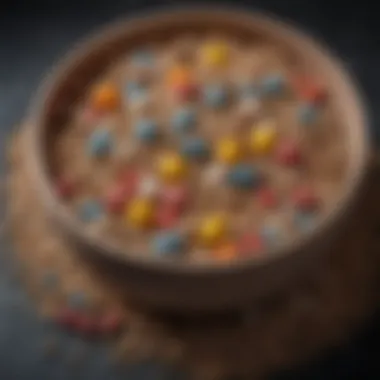
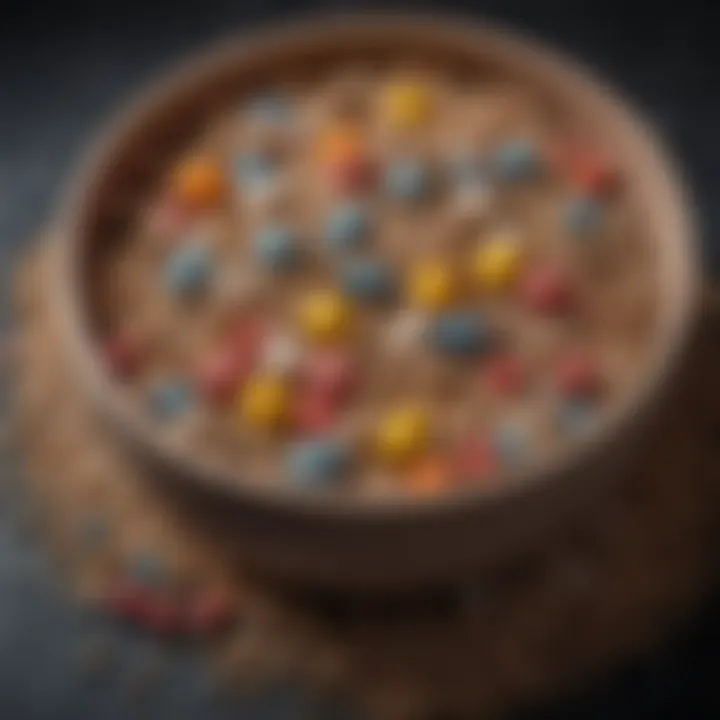
Intro
The pellet diet for pet birds represents a significant shift in how avian nutrition is approached. Understanding this diet is critical for many bird owners and enthusiasts. With a focus on balanced and scientifically formulated nutrition, the pellets are designed to meet the needs of various bird species. This approach provides a solution to some of the drawbacks associated with traditional seed-based diets, which can lead to nutritional deficiencies.
This article aims to explore the pellet diet in depth. We will look into its components, benefits, potential challenges, and practical integration into your bird's existing dietary habits. Transitioning pet birds from seeds to pellets involves careful planning and deep understanding of their needs. The significance of owner education cannot be overstated when it comes to improving avian welfare through informed dietary options.
Care Tips
Daily Care Routines
Establishing a structure for daily care is paramount. This often involves regular feeding times, ensuring fresh water is available, and cleaning the cage space to keep a healthy environment. Not only does this routine help with the bird's physical health, but it also promotes behavioral stability by providing predictability.
Cage Setup and Maintenance
The cage should reflect the needs of the species you own. Provide ample space for movement, toys for stimulation, and a separate area for feeding—ideally using dishes that are replaceable to maintain cleanliness. The cage should be made of materials that are safe and easy to clean.
- Dimensions: The cage ought to be sufficiently spacious, considering flight patterns specific to species.
- Positioning: Place the cage in a well-lit area but avoid direct sunlight, as intense heat can stress birds.
Hygiene and Cleaning Practices
Maintaining hygiene will deter disease and promote well-being. It's best to sweep away uneaten food daily and replace soiled bedding. This habit helps to minimize odor and harmful bacteria development.
- Weekly Maintenance: Consider a deep clean of all items in the bird's environment at least once a week.
Seasonal Care Adjustments
Adapting to seasonal changes can influence care routines. In winter, increase warmth sources while in summer, ensure ventilation. Be wary of drafts, humid conditions, or extreme temperatures, which could disturb your bird's health.
Behavioral Insights
Understanding Bird Body Language
Birds express themselves through body language, which is unique and varied across different species. Being attuned to these signals can allow you to intervene constructively when necessary. Rapid flapping, puffed feathers, or a withdrawn posture often indicate discomfort or stress.
Common Behavioral Issues and Solutions
Certain behavioral issues might arise from an inadequate diet. A diet high in seeds may cause obesity, leading to problems such as aggression or insatiable begging.
Positive Reinforcement Techniques
Acknowledging and rewarding positive interactions will foster good behavior. Seek opportunities for praise when your bird engages appropriately during care routines or training sessions.
Social Interaction Needs
Most birds are social animals. Therefore managing loneliness is essential. Consider spending time together and forming a bond. Pair up birds of compatible species if space allows, but be cautious; not every bird gets along.
Nutrition Guides
Essential Diet Components
A pelleted diet often includes a mix of necessary vitamins and minerals. Be sure it meets the unique dietary needs of your bird's species, considering factors like gender and age.
Safe and Toxic Foods
Avoid feeding your bird certain common foods such as chocolate, avocado, or caffeine. It's recommended to maintain a list of safe snacks and as well as known toxins.
Supplements and Treats
Adding a limited range of selective treats can add excitement and variety. Use fruit, vegetables, or store-bought options made for birds as occasional rewards.
Feeding Strategies for Different Species
Not all birds are the same; dietary preferences may vary widely. Research your specific bird species for customized feeding guidelines.
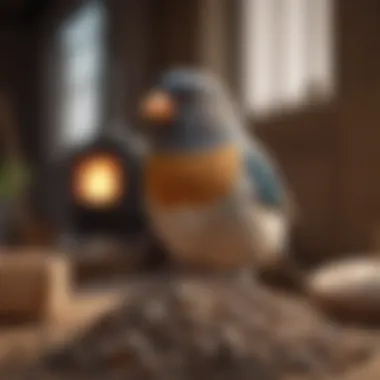
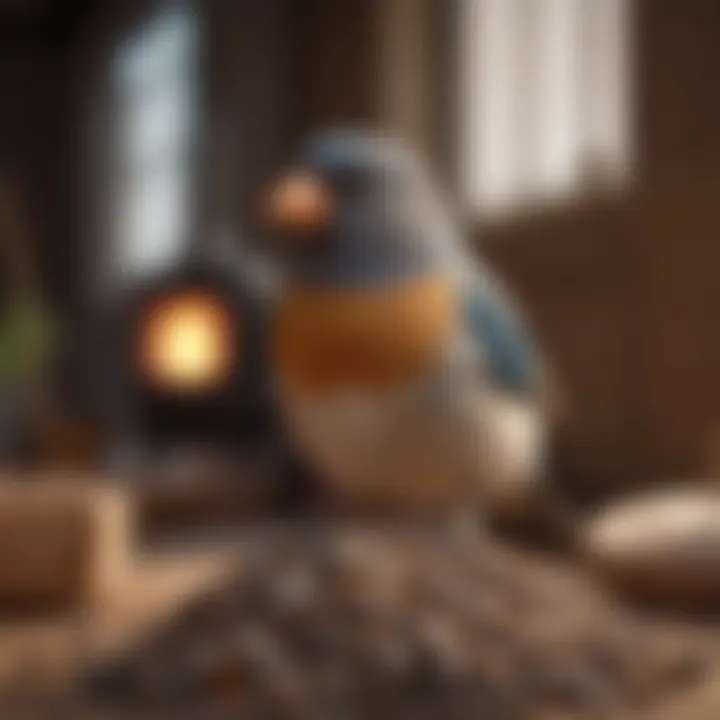
Wellness and Health
Routine Health Checkups
Regular vet visits are crucial. Health conditions often arise gradually, making early intervention important for long-term health. Consider annual checkups and follow-up visits as necessary.
Identifying Symptoms of Illness
Be observant. Changes in behavior, plumage condition, or eating habits can signal a problem. Early detection is key to effective treatment.
Preventative Care and Vaccinations
Talk with your avian veterinarian regarding vaccinations and relevant preventative health measures specific to your bird species. Friendliness just cannot overcome illness caused by neglect in this area.
Mental and Emotional Well-being
Monitor your bird's emotional state. Offering toys or activities that eliminate boredom positively impacts mood and behavior, enhancing overall well-being.
Enriching Activities
Toys and Playtime Ideas
Providing toys that mimic natural play stimulates mental health. Choose a variety now until you find what engages your bird the best.
Training and Tricks
Training is not just a fun pastime; it serves as a bonding experience that simultaneously satisfies a bird’s intelligence.
Outdoor Activities and Interaction
Supervised outdoor-time enriched your pet bird’s senses. Explore safe, bird-specific outdoor interactions to bolster physical and social strengths.
DIY Projects for Mental Stimulation
Crafting toys or arranging unique challenges will keep your bird occupied. Simple, safe projects like foraging toy puzzles can stimulate the mind and lead to greater well-being.
In summary, comprehending the pellet diet for pet birds can enhance overall avian care. Integrate health, nutrition, and behavioral insights towards a holistic plan that benefits both pet and owner.
Overview of the Pellet Diet
The pellet diet stands out as a significant aspect of avian nutrition. This section will explain its essential components, advantages, and various considerations for bird owners. Choosing the right diet for pet birds influences their overall health and well-being. Understanding the pellet diet ensures owners make informed decisions about their birds' nutrition.
Definition and Composition
A pellet diet is a formulated mixture designed to meet the unique nutritional needs of pet birds. Pellets are typically made from a blend of grains, seeds, vitamins, and minerals. These ingredients are processed into small, easily digestible shapes. Unlike traditional seed diets, pellets aim for a more balanced nutrient profile.
Key components of a typical pellet diet include:
- Carbonhydrates: Provide energy.
- Proteins: Support tissue growth and repair.
- Fats: Support metabolic functions.
- Vitamins and Minerals: Essential for overall health and prevention of deficiencies.
The specific formula varies among brands but adheres to the nutritional guidelines developed from research in avian biology. Therefore, owners should look for high-quality pellets that identify clear nutrient content.
Comparison with Seed Diets
Seed-based diets have historically been common among bird owners, but they have notable limitations. A diet composed primarily of seeds lacks the variety of vitamins and minerals found in pellets. Seeds, particularly sunflower seeds, can also be high in fat, which may lead to obesity when consumed in excess.
Some key points of comparison include:
- Nutrition: Pellets provide a more balanced, complete nutritional profile compared to seeds.
- Caloric content: Seeds can lead to excessive calorie intake because birds often selectively eat favored types, leading to unbalanced diets.
- Wastage: Pellets generate less waste due to their complete nourishment, while birds often discard less appealing seeds.
Many considerations suggest that giving puff the nutritional benefits of a pellet diet may indeed promote optimal health for pet birds. Compared to seed diets, the advantages of pellets are clear, supporting the ongoing move among owners to adopt this dietary change.
Nutritional Benefits of Pellets
When considering the health and well-being of pet birds, an understanding of the nutritional benefits of pelleted diets is essential. Pellets offer a concentrated source of nutrients, which is critical for the maintenance of optimal avian health. They are specifically formulated to meet the dietary requirements of various bird species and provide a more balanced alternative to traditional seed diets.
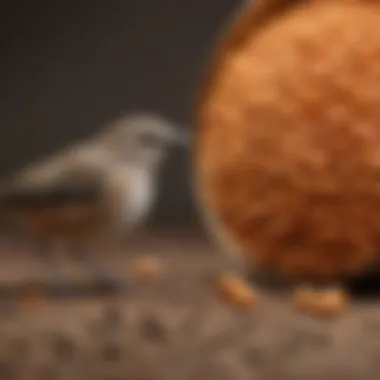
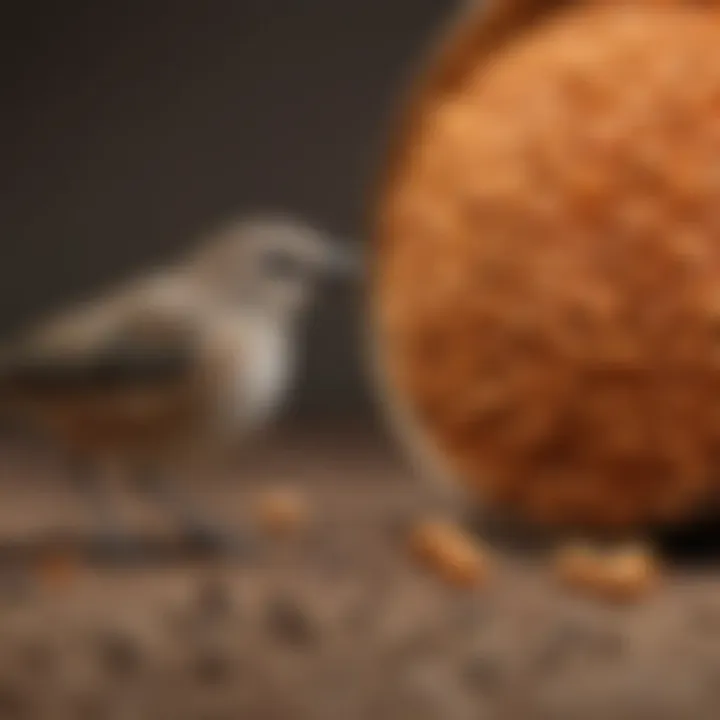
Balanced Macronutrients
Pellets are typically designed to contain the right proportions of macronutrients—carbohydrates, proteins, and fats—needed for a pet bird's health. Each component plays a unique role in supporting overall bodily functions. Carbohydrates provide energy. Proteins are vital for growth, repair of tissues, and maintenance of a healthy immune system. Fats provide additional energy and help with the absorption of certain vitamins. The formulation of these nutrients is comprehensive and balanced, far exceeding the coverage that seed-based diets provide.
Essential Vitamins and Minerals
In the world of avian nutrition, the inclusion of essential vitamins and minerals cannot be understated. Pelleted diets are generally fortified with micronutrients that birds might not adequately receive from seeds alone. For example, vitamins like A, D, and E, and minerals like calcium and phosphorus play crucial roles in vision, bone health, and overall metabolic functions. While seeds may be appealing, they frequently lack sufficient amounts of these elements and can lead to conditions like calcium deficiency or poor feathering. The tailored formulations found in pellet diets ensure that pet birds receive a variety of these important nutrients, supporting their long-term health.
Digestibility and Absorption
Pellets are also more digestible compared to seeds. The processing involved in pellet creation often reduces anti-nutritional factors present in raw seeds, making it easier for birds to extract required nutrients. This increased digestibility translates to better absorption of list critical things in food. Efficient absorption means that essential nutrients are utilized appropriately, increasing the likelihood of optimal health outcomes. For pet birds, a well-absorbing diet is fundamental to reduce waste and maximize nutrient intake, making pellets an intelligent choice for their meals.
In summary, pelleted diets for pet birds bring significant nutritional advantages. They offer a comprehensive mix of balanced macronutrients, essential vitamins and minerals, and improved digestibility, translating to better overall health for our feathered companions.
Potential Challenges of Pellet Feeding
Feeding pellets to pet birds presents numerous advantages, yet it is vital to understand the challenges. Overcoming these challenges ensures your bird receives optimal nutrition, which directly influences their health and behavior. Certainly, recognizing what these challenges are and how to effectively deal with them is crucial for any bird owner.
Acceptance by Birds
One significant challenge is getting birds to accept pellets. Many birds have a naturally strong preference for seeds. Transitioning to pellets can be met with resistance. Birds may not initially recognize pellets as food, especially if they have been raised on seed-based diets. It takes time and patience.
To encourage acceptance, consider the following strategies:
- Gradual Mixing: Start by mixing a small amount of pellets with their usual seeds. Gradually increase the pellet ratio over time.
- Variety in Shapes and Flavors: Different birds may have varied preferences. Trying different brands and types of pellets—such as those with different colors or shapes—may lead to acceptance.
- Freshness and Quality: Make sure to offer fresh pellets. Stale or poor-quality ones deter bird willingness.
Being consistent with encouragement can help. It’s essential to not only offer praise when the bird tries pellets but also to be patient as some birds take longer to neglect seeds.
Nutritional Imbalance Risks
Even when transitioning to pellets, there is a risk of diet imbalance. Some owners may unknowingly offer only pellets, believing that they contain all necessary nutrients. However, it’s important to remember that pellets, while formulated for nutritional completeness, do not cover all dietary needs entirely.
Birds that are fed could become deficient in certain vitamins or minerals. It’s crucial to:
- Supplement with Fresh Foods: Including fresh vegetables, fruits, and grains is essential for overall avian health.
- Pay Attention to Composition: Not all pellet brands are equal. It is important to review labels and ensure they contain quality ingredients and proportions.
- Observe Behavior: If your bird shows lethargy or a change in feather quality, it may suggest an imbalance.
This demonstrate the need for proactive monitoring and adjustments in diet to avoid nutritional shortages despite the advantages of a pellet diet.
Cost Considerations
When committing to a pellet diet, cost can be a significant consideration. Pellets tend to be pricier compared to seeds. The initial investment may lead some to worry about long-term affordability.
However, when considering the overall cost to keep a bird healthy, pellets can be a sound investment:
- Health Costs Saved: Poor nutrition often leads to health issues, resulting in higher veterinary expenses.
- Longer Lifespan: Well-nourished birds may enjoy longer and healthier lives, so an initial gamble on cost ultimately occurs less often.
- Less Waste: With pellets, portion control becomes easier, and there's less mess compared to seeds and possible spoilage.
By weighing these factors, pet owners can better rationalize the costs involved in shifting towards pellet-based feeding without distress.
Considering the challenges of pellet feeding can help create a solid strategy towards better health outcomes for your avian companions.
Transitioning to a Pellet Diet
Transitioning your bird to a pellet diet is a significant move, one that can considerably benefit their health and well-being. Since pellets are designed to provide balanced nutrition, ensuring a smooth transition is essential to foster acceptance and prevent possible nutritional deficiencies during adjustment. The array of nutrients available in pellets far outweighs what seeds offer, making the change worthwhile.
The process involves understanding your bird’s specific needs, preferences, and health conditions. Each phase entails gradual adjustments to minimize stress and ensure easy adaptation to the new diet. Thus, a well-planned approach yields better outcomes and enhances the overall avian nutrition.
Gradual Preface Strategies
A sudden switch from a seed-based diet to pellets can shock a bird’s system. Instead, introducing pellets gradually is the best strategy. This can be done through several methods:
- Mixing Diets: Start by mixing a small amount of pellets with the bird’s traditional seeds. Over time, increase the number of pellets, gradually decreasing the seed proportion.
- Offering Variety: You can offer flavored or colored pellets to entice your bird. Sometimes, the right texture or taste makes all the difference.
- Timing Matters: Creating a mealtime routine where pellets are introduced when the bird is hungry encourages exploration. Birds are naturally curious, and hunger can drive them to try something new.
These approaches aim to create a sense of comfort for the bird during the transition while ensuring they receive proper nutrients. Remember, patience is key; some birds may take longer to adapt than others.
Monitoring Behavioral Changes
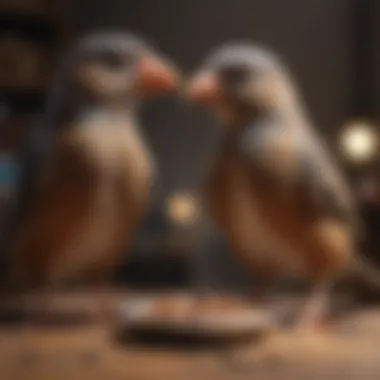
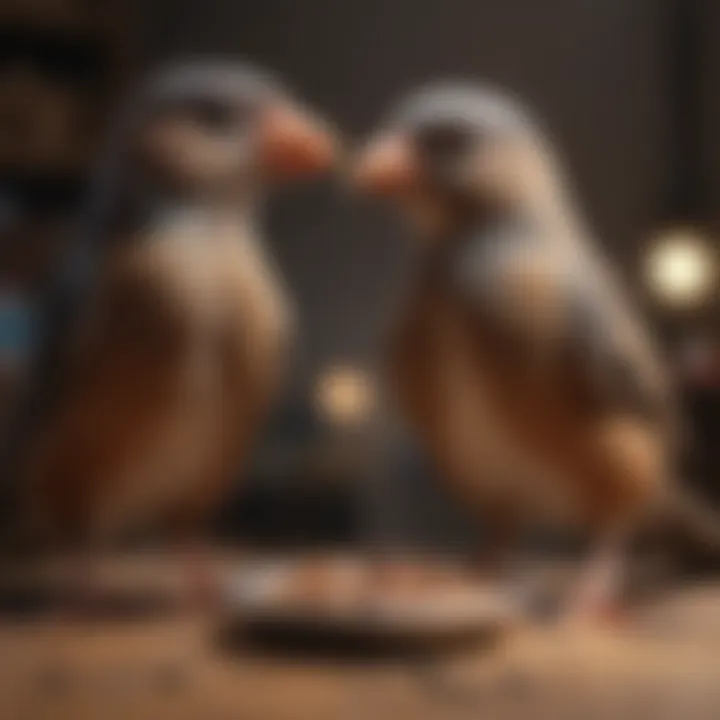
As you undertake this switch, observing your bird's behavior is vital. It's normal to see some resistance initially, but monitoring can help identify positive or concerning trends. Here’s what to look out for:
- Curiosity Towards Pellets: Your bird might show interest in investigating pellets. Encouraging positive behavior will gradually help them associate pellets with a wholesome experience.
- Eating Habits: Keep an eye on the quantity of food consumed. If there is a significant drop in food intake, adjustments may be needed to ease initial concerns.
- Overall Energy Levels: A decrease in energy or changes in behavior can indicate issues. If the bird seems lethargic or refuses pellets completely for several days, consult an avian veterinarian.
Regular observation provides insights, thus facilitating the plan effectively. You know your pet best, and any behavioral irregularities should not be ignored.
Adjusting to a pellet diet is a process that can genuinely uplift a bird’s health, but it requires diligence and careful monitoring to secure the best long-term outcomes. Knowing when to seek expert advice contributes markedly to this responsibility, aligning the transition with the bird’s dietary and emotional needs.
Integrating Variety in Avian Diets
Integrating variety within avian diets is crucial for the ongoing health and well-being of pet birds. A diet that includes different foods helps to ensure a balanced intake of nutrients. Birds do not thrive solely on pellets. There are specific elements of avian diets that connection to their quality of life.
Role of Fresh Foods
Fresh foods are an essential component of avian diets. They provide hydration and contain vital nutrients not always present in pellets. Fresh fruits and vegetables are suitable choices, complementary to a pellet base. Some good options include:
- Leafy greens like kale and spinach
- Introduce colorful fruits, such as berries, kiwi, and slices of banana
- Root vegetables like carrots or sweet potatoes can offer extra fiber
Including these fresh elements contributes not only to physical health but also involves mental stimulation. Birds often enjoy the quick changes of texture and flavor that fresh foods introduce. Watch to see how birds develop preferences. Observing these behaviors informs adjustments to their dietary needs. Also, be aware of how often to offer fresh items, as they can spoil quickly in their environment.
Incorporating Treats and Supplements
In addition to pellets and fresh foods, incorporating treats and natural supplements can support avian nutrition. Organic seeds, nuts, or specially-formulated treats offer excitement along momentarily ticking off taste buds. However, understanding the balance is key, as too much can lead to unhealthy habits. A few points to conisder:
- Choose high-qualty treats that maintain the health of your bird.
- Be cautious with sugar levels,—syrup-coated products are often overly processed.
- Natural supplements like spirulina provide extra vitamins.
Using these selections sparingly helps to create an interesting and stimulating feeding routine. Change treats regularly to measure reactions. Challenge your knowledge, look for alternatives in pet bird enthusiasts’ communities like subreddits at Reddit. In particular, many users exchange ideas about healthy variations and safe ingredients. This variety not only eases boredom but also supports overall health, contributing to the joy and life of pet birds when managed appropriately.
Staying Informed About Avian Nutrition
Staying informed about avian nutrition is crucial for the well-being of pet birds. Knowledge enhances the ability of bird owners to make choices that positively impact their birds' health. An informed approach ensures that the dietary needs of birds are met, leading to better overall outcomes. Nutrition forms the basis of a bird's health and longevity. Understanding nutrition helps bird owners avoid common pitfalls and embrace best practices.
Continuing Education for Bird Owners
For many owners, especially those managing their first bird, continuous education acts as a core pillar in raising a healthy companion. Regularly updating oneself about the latest findings in avian nutrition is quite beneficial for several reasons. Firstly, the field of avian care evolves as researchers make new discoveries. Armed with recent knowledge, owners can adjust their bird's diet in real-time.
Additionally, educational resources span various formats. These can be recognized in books focused on avian health, workshops for pet bird care, and even online courses. Furthermore, joining digital communities can elevate understanding. Websites like Reddit provide platforms for discussions on strategies and experiences around pellet feeding.
- Identify Nutrient Deficiencies: Knowledge allows birds' owners to notice signs of deficiencies earlier.
- Trustworthy Resources: Staying updated helps in discerning credible dietary guidelines.
Investing time in education amplifies a bird owner’s capability to nurture and promote better health. Advocacy for pelleted diets further stem from well-informed decisions.
Consulting with Avian Veterinarians
The role of avian veterinarians in a bird's dietary management cannot be overstated. These professionals possess specialized knowledge that translates into best-care practices tailored for individual birds. Building a trusted relationship with these experts enables higher-quality care, particularly when it comes to dietary transitions.
A veterinarian can:
- Provide tailored recommendations based on specific bird species which vary greatly in nutritional needs.
- Monitor health parameters, ensuring any dietary choices remain optimal.
- Address concerns regarding palatability, which may pose issues when introducing new foods.
With avian veterinarians, discussions should focus on diet-related changes. Such conversations reveal whether pellets can effectively replace the conventional seed diets. Regular check-ups not only offer chance to discuss diet but verify that birds are responding well to these feed changes.
Well-informed bird owners can greatly improve their pet's quality of life through consistent education and professional veterinary consultation.
Ultimately, consulting with an avian veterinarian combined with a commitment to informed ownership translates into birds receiving the comprehensive care they need and deserve.
Culmination: The Role of Pellets in Avian Well-Being
In summary, the adoption of a pellet diet for pet birds has potential benefits that greatly contribute to their overall health and well-being. The shift from seed-based diets to pellets is not merely a dietary change but a fundamental enhancement in nutrition that can significantly affect a pet bird's life span and quality of life. Pellets are designed to provide balanced nutrition, supplying necessary vitamins and minerals that seed diets often lack. This aspect is crucial, as many common health issues in pet birds stem from nutritional deficiencies.
Pellets encourage a consistent nutrient intake. The formulation of these pellets typically includes a blend that offers adequate protein, fats, and carbohydrates along with essential amino acids. Therefore, they don’t just serve as food but as essential sources of life-sustaining elements that facilitate better organ function, improved metabolic health, and enhanced immune capabilities. In contrast, many seeds can be high in fat while providing limited essential nutrients, leading to various health issues like obesity and fatty liver disease in birds.
It is also important to consider the behavioral aspects. Establishing pellets as a primary food source can foster healthy eating habits in pet birds while limiting selective feeding—a behavior where birds only consume their preferred seeds. Such habits can exacerbate the lack of diverse nutrition which these birds need.
While discussing the pellet diet's advantages, one must acknowledge the challenges. Successfully transitioning a bird to this new diet requires patience and possibly the effectiveness of various techniques for acceptance. Owners should explore incremental changes and continuously monitor their pet's adaptation and health responses through this dietary shift.
Birds, as intelligent creatures, benefit enormously when their nutritional needs are met thoughtfully. Thus, educating fellow pet owners and breeders on the significance of a well-rounded pellet diet is imperative. Informed choices about pet diets not only enhance individual avian health but contribute to a broader awareness of proper avian care.
A well-formulated pellet diet can prevent many nutrition-related issues common in pet birds, fostering longevity and better quality of life.
Overall, the role of pellets cannot be overstated when considering avian well-being. They are not only crucial for immediate health conditions but also play a long-term role in ensuring a robust and vibrant life for our feathered companions.















